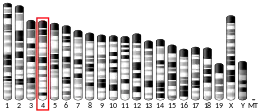FUSIP1
FUS-interacting serine-arginine-rich protein 1 is a protein that in humans is encoded by the SFRS13A gene.[5][6][7]
Function
This gene product is a member of the serine-arginine (SR) family of proteins, which is involved in constitutive and regulated RNA splicing. Members of this family are characterized by N-terminal RNP1 and RNP2 motifs, which are required for binding to RNA, and multiple C-terminal SR/RS repeats, which are important in mediating association with other cellular proteins. This protein can influence splice site selection of adenovirus E1A pre-mRNA. It interacts with the oncoprotein TLS and abrogates the influence of TLS on E1A pre-mRNA splicing. Alternative splicing of this gene results in at least two transcript variants encoding different isoforms. In addition, transcript variants utilizing alternative polyA sites exist.[7]
References
- GRCh38: Ensembl release 89: ENSG00000188529 - Ensembl, May 2017
- GRCm38: Ensembl release 89: ENSMUSG00000028676 - Ensembl, May 2017
- "Human PubMed Reference:". National Center for Biotechnology Information, U.S. National Library of Medicine.
- "Mouse PubMed Reference:". National Center for Biotechnology Information, U.S. National Library of Medicine.
- Yang L, Embree LJ, Tsai S, Hickstein DD (November 1998). "Oncoprotein TLS interacts with serine-arginine proteins involved in RNA splicing". J. Biol. Chem. 273 (43): 27761–4. doi:10.1074/jbc.273.43.27761. PMID 9774382.
- Clinton JM, Chansky HA, Odell DD, Zielinska-Kwiatkowska A, Hickstein DD, Yang L (March 2002). "Characterization and expression of the human gene encoding two translocation liposarcoma protein-associated serine-arginine (TASR) proteins". Gene. 284 (1–2): 141–7. doi:10.1016/S0378-1119(02)00382-7. PMID 11891055.
- "Entrez Gene: FUSIP1 FUS interacting protein (serine/arginine-rich) 1".
- Yang L, Embree LJ, Hickstein DD (May 2000). "TLS-ERG leukemia fusion protein inhibits RNA splicing mediated by serine-arginine proteins". Mol. Cell. Biol. 20 (10): 3345–54. doi:10.1128/MCB.20.10.3345-3354.2000. PMC 85627. PMID 10779324.
Further reading
- Maruyama K, Sugano S (1994). "Oligo-capping: a simple method to replace the cap structure of eukaryotic mRNAs with oligoribonucleotides". Gene. 138 (1–2): 171–4. doi:10.1016/0378-1119(94)90802-8. PMID 8125298.
- Andersson B, Wentland MA, Ricafrente JY, Liu W, Gibbs RA (1996). "A "double adaptor" method for improved shotgun library construction". Anal. Biochem. 236 (1): 107–13. doi:10.1006/abio.1996.0138. PMID 8619474.
- Yu W, Andersson B, Worley KC, Muzny DM, Ding Y, Liu W, Ricafrente JY, Wentland MA, Lennon G, Gibbs RA (1997). "Large-scale concatenation cDNA sequencing". Genome Res. 7 (4): 353–8. doi:10.1101/gr.7.4.353. PMC 139146. PMID 9110174.
- Suzuki Y, Yoshitomo-Nakagawa K, Maruyama K, Suyama A, Sugano S (1997). "Construction and characterization of a full length-enriched and a 5'-end-enriched cDNA library". Gene. 200 (1–2): 149–56. doi:10.1016/S0378-1119(97)00411-3. PMID 9373149.
- Yang L, Embree LJ, Hickstein DD (2000). "TLS-ERG leukemia fusion protein inhibits RNA splicing mediated by serine-arginine proteins". Mol. Cell. Biol. 20 (10): 3345–54. doi:10.1128/MCB.20.10.3345-3354.2000. PMC 85627. PMID 10779324.
- Cowper AE, Cáceres JF, Mayeda A, Screaton GR (2001). "Serine-arginine (SR) protein-like factors that antagonize authentic SR proteins and regulate alternative splicing". J. Biol. Chem. 276 (52): 48908–14. doi:10.1074/jbc.M103967200. PMID 11684676.
- Andersen JS, Lyon CE, Fox AH, Leung AK, Lam YW, Steen H, Mann M, Lamond AI (2002). "Directed proteomic analysis of the human nucleolus". Curr. Biol. 12 (1): 1–11. doi:10.1016/S0960-9822(01)00650-9. PMID 11790298. S2CID 14132033.
- Shin C, Manley JL (2002). "The SR protein SRp38 represses splicing in M phase cells". Cell. 111 (3): 407–17. doi:10.1016/S0092-8674(02)01038-3. PMID 12419250. S2CID 13215962.
- Li J, Hawkins IC, Harvey CD, Jennings JL, Link AJ, Patton JG (2003). "Regulation of alternative splicing by SRrp86 and its interacting proteins". Mol. Cell. Biol. 23 (21): 7437–47. doi:10.1128/MCB.23.21.7437-7447.2003. PMC 207616. PMID 14559993.
- Shin C, Feng Y, Manley JL (2004). "Dephosphorylated SRp38 acts as a splicing repressor in response to heat shock". Nature. 427 (6974): 553–8. Bibcode:2004Natur.427..553S. doi:10.1038/nature02288. PMID 14765198. S2CID 4423246.
- Beausoleil SA, Jedrychowski M, Schwartz D, Elias JE, Villén J, Li J, Cohn MA, Cantley LC, Gygi SP (2004). "Large-scale characterization of HeLa cell nuclear phosphoproteins". Proc. Natl. Acad. Sci. U.S.A. 101 (33): 12130–5. Bibcode:2004PNAS..10112130B. doi:10.1073/pnas.0404720101. PMC 514446. PMID 15302935.
- Jin J, Smith FD, Stark C, Wells CD, Fawcett JP, Kulkarni S, Metalnikov P, O'Donnell P, Taylor P, Taylor L, Zougman A, Woodgett JR, Langeberg LK, Scott JD, Pawson T (2004). "Proteomic, functional, and domain-based analysis of in vivo 14-3-3 binding proteins involved in cytoskeletal regulation and cellular organization". Curr. Biol. 14 (16): 1436–50. doi:10.1016/j.cub.2004.07.051. PMID 15324660. S2CID 2371325.
- Benzinger A, Muster N, Koch HB, Yates JR, Hermeking H (2005). "Targeted proteomic analysis of 14-3-3 sigma, a p53 effector commonly silenced in cancer". Mol. Cell. Proteomics. 4 (6): 785–95. doi:10.1074/mcp.M500021-MCP200. PMID 15778465.
- Shin C, Kleiman FE, Manley JL (2005). "Multiple properties of the splicing repressor SRp38 distinguish it from typical SR proteins". Mol. Cell. Biol. 25 (18): 8334–43. doi:10.1128/MCB.25.18.8334-8343.2005. PMC 1234314. PMID 16135820.
- Rual JF, Venkatesan K, Hao T, Hirozane-Kishikawa T, Dricot A, Li N, Berriz GF, Gibbons FD, Dreze M, Ayivi-Guedehoussou N, Klitgord N, Simon C, Boxem M, Milstein S, Rosenberg J, Goldberg DS, Zhang LV, Wong SL, Franklin G, Li S, Albala JS, Lim J, Fraughton C, Llamosas E, Cevik S, Bex C, Lamesch P, Sikorski RS, Vandenhaute J, Zoghbi HY, Smolyar A, Bosak S, Sequerra R, Doucette-Stamm L, Cusick ME, Hill DE, Roth FP, Vidal M (2005). "Towards a proteome-scale map of the human protein-protein interaction network". Nature. 437 (7062): 1173–8. Bibcode:2005Natur.437.1173R. doi:10.1038/nature04209. PMID 16189514. S2CID 4427026.



